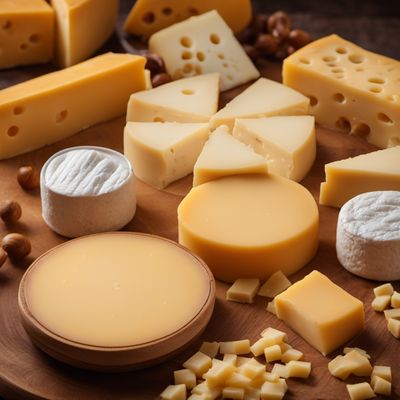
Ingredient
Cheese, roncal
The Quintessential Spanish Delight: Roncal Cheese
Roncal cheese is a semi-hard, unpasteurized sheep's milk cheese that originates from the Roncal Valley in the Navarre region of Spain. It has a pale yellow color and a firm, slightly crumbly texture. The cheese is aged for a minimum of four months, during which it develops a complex flavor profile with nutty, buttery, and slightly tangy notes. Its aroma is earthy and reminiscent of the lush pastures where the sheep graze. Roncal cheese is often adorned with a characteristic herringbone pattern on its rind, which is a result of the traditional esparto grass molds used during the cheese-making process.
Origins and history
Roncal cheese has a long-standing history that dates back to the 13th century when shepherds in the Roncal Valley began producing it. It holds the distinction of being the first cheese in Spain to receive Protected Designation of Origin (PDO) status in 1981, recognizing its unique qualities and traditional production methods. The cheese is deeply rooted in the local culture and has been an integral part of the Navarre region's culinary heritage for centuries.
Nutritional information
Roncal cheese is a good source of protein, calcium, and phosphorus. It is also rich in vitamins A and D. A 1-ounce (28g) serving of Roncal cheese contains approximately 110 calories.
Allergens
Roncal cheese contains milk and is not suitable for individuals with lactose intolerance or milk allergies.
How to select
When selecting Roncal cheese, look for a cheese that has a firm texture and a slightly oily surface. The color should be pale yellow, and the rind should be intact and free from any mold or discoloration. Opt for cheeses that have been aged for at least four months for a more pronounced flavor.
Storage recommendations
To maintain the freshness and quality of Roncal cheese, it is best stored in the refrigerator. Wrap it tightly in wax paper or cheese paper to allow it to breathe while protecting it from moisture. Stored properly, Roncal cheese can last for several weeks.
How to produce
Roncal cheese production requires specialized knowledge and equipment. It is best left to professional cheesemakers who follow traditional methods of sheep's milk curdling, pressing, and aging. However, for those interested in cheese-making, there are resources available that provide guidance on producing similar sheep's milk cheeses.
Preparation tips
Roncal cheese is incredibly versatile and can be enjoyed in various ways. It can be served on a cheese board with fruits, nuts, and crackers, grated over pasta dishes, melted in sandwiches or quesadillas, or used as a flavorful addition to salads and soups. Its robust flavor pairs well with bold red wines, honey, and dried fruits.
Substitutions
If Roncal cheese is not available, a suitable substitute would be Pecorino Romano or Manchego cheese, which share similar characteristics and flavors.
Culinary uses
Roncal cheese is a staple in Spanish cuisine and is often enjoyed on its own or incorporated into traditional dishes such as pintxos, tapas, and tortillas. It adds depth and richness to salads, stews, and grilled vegetables. It can also be grated over pasta or used as a filling for empanadas and savory pastries.
Availability
Roncal cheese is primarily available in Spain, particularly in the Navarre region where it is produced. It can also be found in specialty cheese shops or gourmet food stores in other countries, albeit in limited quantities.
More ingredients from this category » Browse all

Cheese, schabziger
The Alpine Secret: Unveiling the Tangy Delights of Schabziger Cheese

Cheese, evora
Evora: A Portuguese Delight

Cheese, iberico
The Quintessential Delight: Exploring the Richness of Iberico Cheese

Cheese, kefalotyri
The Bold Greek Delight

Cheese, aged graviera
Savory Greek Delight

Cheese, mahon
The Quintessential Taste of Mahon: Exploring the Richness of Mahon Cheese

Cheese, montasio
The Alpine Delight: Exploring the Richness of Montasio Cheese

Cheese, cheddar
"The King of Cheeses: Unveiling the Richness of Cheddar"

Cheese, majorero
Majorero: The Flavorful Cheese from the Canary Islands

Cheese, castelmagno
The King of Piedmont: Castelmagno Cheese

Cheese, cacio di fossa
The Hidden Gem of Italian Cheeses: Cacio di Fossa

Cheese, idiazabal
The Basque Treasure